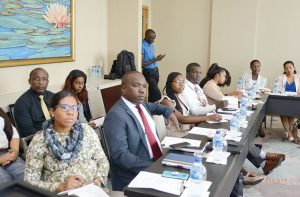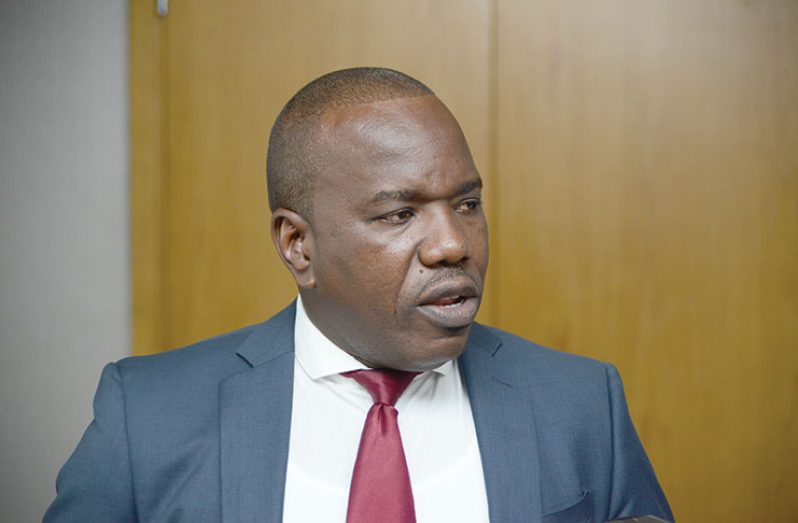THE World Health Organisation (WHO) has estimated that one in 10 medical products circulating in low- and middle-income countries is either substandard or falsified.
And according to Director of the Government Analyst Food and Drug Department, Marlon Cole, it is more than likely that Guyana has a higher rate of substandard and falsified medical products on its market.
Cole explained that several distributors of pharmaceuticals and other medical supplies have not acquired Marketing Authorisation as required by Law, and as such, are engaging in the sale and distribution of pharmaceuticals that are not approved by the Food and Drug Department.
According to him, there is “a lot of push back” from distributors.
On the sideline of a capacity-building forum held by the Food and Drug Department and AstraZeneca Pharmaceutical Company, Cole said that since 2014, the department has increasingly enforced the legislation mandating distributors to acquire Marketing Authorisation and Drug Registration, but many have managed to avoid the system.
“A lot of companies locally do not want to be compliant with the registration regime… In the past, drugs got unto our market without being registered and it is only now we are trying to clean things up and ensure safe and efficacious drugs are out there,” he said.
In an effort to acquire the necessary approval, a distributor is required to prepare a dossier with the critical information on the product, including registration information with supporting evidence that the product is certified to be sold in Europe and North America.

Apart from that, Cole explained that products are also allowed legal entry into Guyana once pre-approved by the WHO or the Caribbean Public Health Agency (CARPHA). In the case of CARPHA, drugs registered in countries such as Mexico, Cuba, Chile, Argentina, Brazil and Columbia are approved through the Caribbean Regulatory System.
The CARPHA/CRS is a regional regulatory mechanism through which market access to safe and effective essential medicines of high quality is accelerated. If a distributor’s submission receives the nod of CARPHA/CRS following review, a recommendation and assessment report is disseminated to all CARICOM governments via government-appointed focal points, and the recommended products are published on a publicly accessible webpage.
Governments are then asked to make a Marketing Authorisation based on the CARPHA/CRS recommendation.
BETTER EQUIPPED
Noting that the Food and Drug Department is better equipped with technical support from organisations such as CARPHA and AstraZeneca, a British-Swedish multinational pharmaceutical and biopharmaceutical company, Cole said the department will be clamping down on distributors.
He warned that once detected, unapproved or certified drugs will be seized upon entry to Guyana or if found within the market. Cole recently returned from Jamaica where he participated in a Regional Stakeholders’ Meeting Post Market Surveillance for Medicines, organised by CARPHA.
During that forum, it was noted that poor quality and falsified medicines, if left unchecked, can reverse progress the region has made in its fight against diseases.
Guyana is currently participating in a pilot project with CARPHA Medicines Quality Control and Surveillance Department (MQCSD) in Jamaica to test drugs in circulation. Eastern Caribbean countries are also a part of the pilot project.
CARPHA MQCSD is the only accredited medicines quality control laboratory in the English-speaking Caribbean and will provide countries like Guyana with test results to confirm the quality of medicines being sold on the market.
Cole said the capacity-building workshop was a timely one.
“This occasion is timely and opportune relative to the threat that we in the developing world, particularly those countries that are low and middle income as it relates to the quality and safety of drugs and medical supplies that have been released for sale on our market,” he said.
He said with 50,000 staff across 19 countries and 30 locations, there is much the Food and Drug Department can learn from AstraZeneca in identifying fake and substandard products.
AstraZeneca Global Security Director, Jeremy Jobson, on behalf of Pharmaceutical Security Institute, painted a vivid picture of the illegal trade in medicine via his skype presentation.
Jobson told the small group present that counterfeit drugs, illegal diversion and theft of pharmaceuticals and medical supplies remain a major problem globally.
Among a selected number of countries including the USA, Russia and Germany, 3,509 cases of fake and substandard products were reported. It was noted that the majority of the fake and or substandard products are for oral use.



.png)









